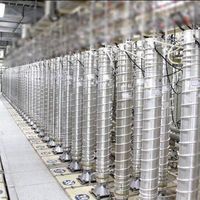Iranian press shows divisions over nuclear talks after Rome meeting
A day after the second round of nuclear talks between Iran and the United States concluded in Rome, Tehran’s major newspapers revealed the ongoing divide between reformists and hardline factions.
While reformist outlets welcomed what they described as swift progress and a move toward technical-level discussions, conservative dailies backed the negotiation team but renewed warnings against what they called US hostility and external opposition from diaspora critics.
On Sunday, Ham-Mihan, a reformist paper aligned with technocratic factions, described the shift to expert-level talks as evidence of agreement on core principles, such as Iran’s continued uranium enrichment.
It called this “a sign of rapid progress” but warned that it did not guarantee a final deal. “The stage reached suggests a framework is in place, but final terms will be decided in detail-oriented discussions,” the editorial said.
The paper also predicted the alleged indirect format of talks may soon shift to direct engagement, arguing that detailed negotiations are impractical through intermediaries.
Shargh, another reformist paper, featured interviews with four former officials and political figures. All welcomed the apparent momentum.
“If external spoilers are kept at bay, this can lead to tangible gains for the Islamic Republic,” said reformist activist Mohammad-Sadegh Javadi-Hessar, adding that European threats to trigger the snapback mechanism appear to have receded.
In contrast, the conservative Farhikhtegan focused on perceived foreign interference. Its lead story, titled “Lobbyists of Tension,” accused a range of organizations—including American Israel Public Affairs Committee (AIPAC), United Against Nuclear Iran (UANI), and the Foundation for Defense of Democracies—of undermining the talks.
It said, without evidence, that these groups, through “financial backing and intelligence ties,” aim to maintain pressure on Iran and shape US foreign policy against Tehran.
The paper also said that "Iranian dissidents abroad were spreading misleading information to derail the negotiations,” framing the process as vulnerable to outside manipulation.
The hardline Kayhan, viewed as reflecting the Supreme Leader’s position, struck a defiant tone. In a lengthy commentary, it warned that negotiations were historically a tool of colonial pressure and argued that only military and nuclear strength had forced the US to the table.
In another piece, Kayhan wrote that excluding Europe and regional states in the talks had allowed Iran to slow the pace and avoid compromise. The writer said “indirect talks humiliated the US, reinforcing Tehran’s standing.”
Saying that US enmity toward the Islamic Republic would persist regardless of the outcome, it added, “The world is watching a diplomatic clash between satanic and divine powers,” as resistance to diplomatic means continued.







